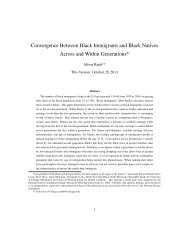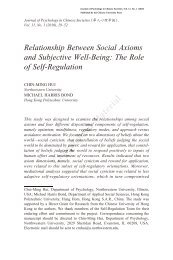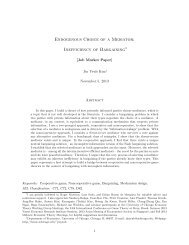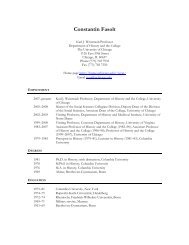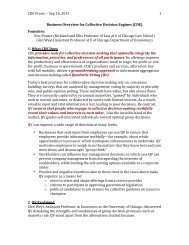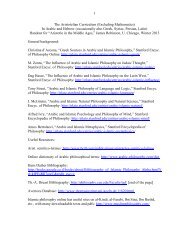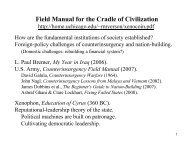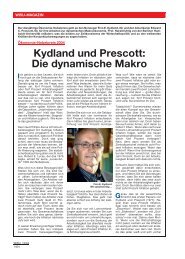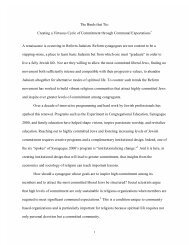Guide to the Study of Early Modern European History For Students ...
Guide to the Study of Early Modern European History For Students ...
Guide to the Study of Early Modern European History For Students ...
Create successful ePaper yourself
Turn your PDF publications into a flip-book with our unique Google optimized e-Paper software.
I have not tried <strong>to</strong> be comprehensive, but <strong>to</strong> cover only areas in which I might<br />
actually examine you. You will <strong>the</strong>refore not find much for <strong>the</strong> period after <strong>the</strong> Peace <strong>of</strong><br />
Westphalia or for any national his<strong>to</strong>ry o<strong>the</strong>r than <strong>the</strong> his<strong>to</strong>ry <strong>of</strong> Germany. You will find a<br />
great deal about <strong>the</strong> his<strong>to</strong>ry <strong>of</strong> political thought, law and legal thought, <strong>the</strong> church, <strong>the</strong> state,<br />
intellectual his<strong>to</strong>ry, religion, and <strong>the</strong> like. You will not find a lot about <strong>the</strong> his<strong>to</strong>ry <strong>of</strong> politics,<br />
but that's only because <strong>the</strong> political his<strong>to</strong>ry <strong>of</strong> early modern Europe is well covered by <strong>the</strong><br />
books listed in <strong>the</strong> preceding section on "general knowledge."<br />
I have not been shy about paying attention <strong>to</strong> older pieces <strong>of</strong> scholarship. That's not<br />
because <strong>the</strong>y have not been superseded by more recent scholarship. In many ways <strong>the</strong>y have.<br />
But familiarity with older pieces <strong>of</strong> scholarship is an invaluable aid in finding one's way<br />
through <strong>the</strong> clutter <strong>of</strong> new books and articles constantly pouring from <strong>the</strong> presses in<strong>to</strong> <strong>the</strong><br />
academy and on<strong>to</strong> <strong>the</strong> web. Without knowing older pieces <strong>of</strong> scholarship that have proven<br />
<strong>the</strong>ir worth over time, it can be very difficult <strong>to</strong> recognize just which recent publications are<br />
really new and significant and which merely add one more study <strong>of</strong> a certain very specific<br />
kind <strong>to</strong> a long and well established list <strong>of</strong> similar studies, or that merely repeat well known<br />
information in a slightly different form with slightly different words, as <strong>the</strong>y <strong>of</strong>ten do at <strong>the</strong><br />
invitation <strong>of</strong> publishers eager <strong>to</strong> survive in an increasingly tight market.<br />
There is no way you can arrange titles in this kind <strong>of</strong> bibliography in a thoroughly<br />
consistent manner unless you use a purely mechanical criterion, like <strong>the</strong> date <strong>of</strong> publication<br />
or authors' last names. But using a mechanical criterion would be counterproductive for<br />
students trying <strong>to</strong> understand how <strong>the</strong> body <strong>of</strong> scholarly knowledge about early modern<br />
Europe is articulated. It's much more enlightening <strong>to</strong> arrange books according <strong>to</strong> some kind<br />
<strong>of</strong> criterion that reflects <strong>the</strong> intellectual relationships in which <strong>the</strong>se books stand <strong>to</strong> each<br />
o<strong>the</strong>r.<br />
I have <strong>the</strong>refore arranged titles according <strong>to</strong> whatever criterion seemed <strong>to</strong> make <strong>the</strong><br />
most sense for a particular group <strong>of</strong> titles—by importance, by author, by <strong>to</strong>pic, by date <strong>of</strong><br />
publication, by genre, by school <strong>of</strong> scholarship, and so on—and I have felt free <strong>to</strong> switch<br />
criteria whenever I could think <strong>of</strong> no better way <strong>to</strong> proceed. That means that <strong>the</strong>se<br />
arrangements reflect nothing more clearly than my own judgment. You may not recognize<br />
<strong>the</strong> reasons why I arranged things <strong>the</strong> way I did, and if you do, <strong>the</strong>y may strike you as<br />
arbitrary. That's fine by me just so long as it helps you <strong>to</strong> recognize what <strong>the</strong>se books have<br />
contributed <strong>to</strong> our knowledge <strong>of</strong> <strong>the</strong> past and how <strong>the</strong>y differ from each o<strong>the</strong>r. Choose<br />
whatever you think will be most useful for your purposes and discuss your choices with me.<br />
2.1 MEDIEVAL BACKGROUND<br />
*Bartlett, Robert. The Making <strong>of</strong> Europe: Conquest, Colonization, and Cultural Change, 950-1350.<br />
Prince<strong>to</strong>n, N.J.: Prince<strong>to</strong>n University Press, 1993.<br />
*Moore, R. I. The First <strong>European</strong> Revolution, c. 970-1215. Oxford: Blackwell Publishers, 2000.<br />
*Moore, R. I. The <strong>For</strong>mation <strong>of</strong> a Persecuting Society: Power and Deviance in Western Europe, 950-<br />
1250. Oxford: Blackwell, 1987.<br />
**Bloch, Marc. Feudal Society. Trans. L. A. Manyon. Chicago: University <strong>of</strong> Chicago Press,<br />
1961.<br />
**Brunner, Ot<strong>to</strong>. Land and Lordship: Structures <strong>of</strong> Governance in Medieval Austria. Trans. with an<br />
introduction by Howard Kaminsky and James Van Horn Mel<strong>to</strong>n. Philadelphia:<br />
University <strong>of</strong> Pennsylvania Press, 1992.<br />
**Tellenbach, Gerd. Church, State and Christian Society at <strong>the</strong> Time <strong>of</strong> <strong>the</strong> Investiture Controversy.<br />
Trans. Ralph F. Bennett. London: Basil Blackwell & Mott, 1959.<br />
22<br />
22





